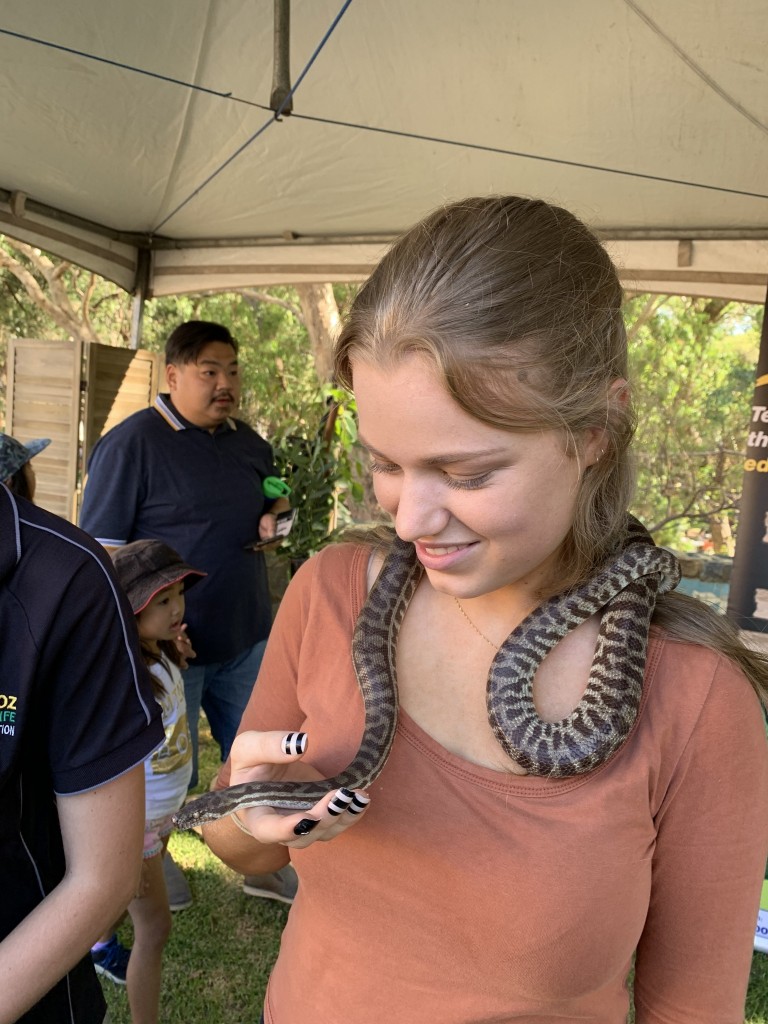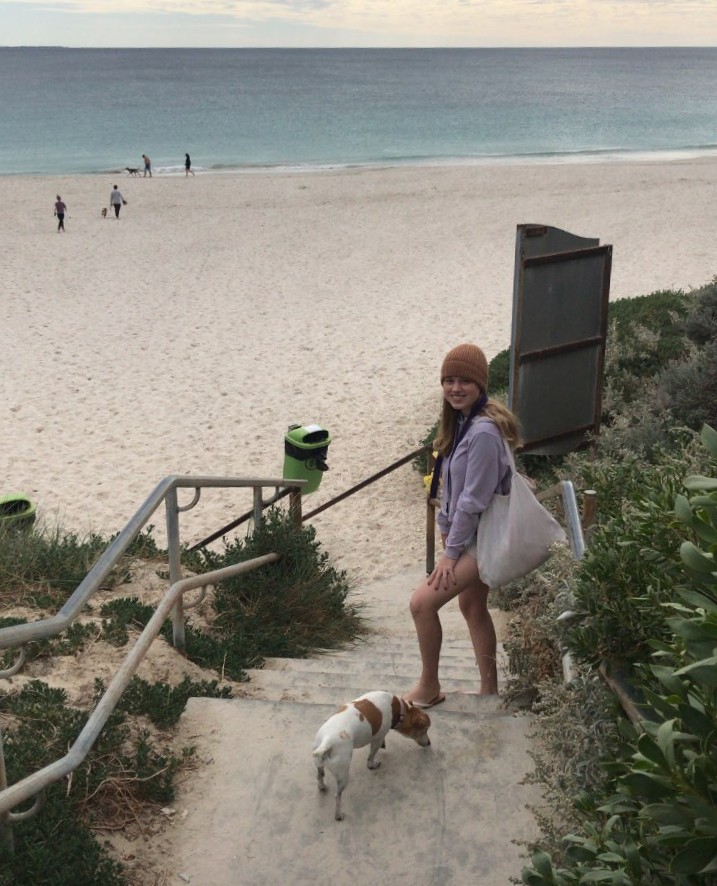
Hayley, 20, shares her experience of MIFWA’s Active Recovery Team of peer workers (ART) who support people who have been in hospital due to mental distress. She says she’s “had just about every form of clinical support and for some reason it just took one (MIFWA) peer support worker who just got it” to flip her whole life around.
Hayley, when did you first discover our Active Recovery Team?
I struggled a lot with my mental health last year and I was connected with MIFWA after a hospital stay on the Youth Mental Health ward. I was put into the outpatient program at Fiona Stanley Hospital and then they said to me that they could connect me with this program through MIFWA. I remember they were explaining it to me but I wasn’t really listening, because I’d just got out of hospital and it was all so much and I was like “Yeah, why not?” That was just my whole attitude: “why not, nothing could go any worse.”
Then I met with my new MIFWA peer worker Tahnee about a week or so later and we went from there. I had no job, I had no courses lined up, no stable accommodation, pretty much nothing, no support. But here I am six months later with my own unit, got a job in real estate, completed a TAFE course, and planning to go back to university next year. Pretty much flipped my whole life around just with a little bit of support.
How did it feel to have that support?
It made me feel wanted, because I think one of the hardest things with mental health is you don’t feel wanted, or you perceive you’re not wanted, whether or not people want you is a different story. But with people actually helping you get back on track, people wanting you there, and then I got my own drive from that to work for myself.
What made you continue with MIFWA?
I remember when I first went, we were doing a list of goals, like a plan. A few of the goals were like “find stable accommodation”, “get me into a TAFE course”. I was like “Yep, I’ll stick with this” because I felt like I did want to achieve all that stuff, but I just didn’t think we’d achieve it that quickly and we had to set up a new list of goals within a few weeks.
It was pretty much the fact that we’d set up these goals, realistic goals, and then Tahnee would locate the resources, and even I would try and do a little bit of the research myself to help me get into a TAFE course, get a job, and find accommodation. I guess it was the success of the actual plan itself that kept me going.
There was a period over Christmas where I was again admitted to hospital. I was homeless, I didn’t have as much family support. But I remember Tahnee was the only person on my team who came in to visit me. I did have people call me and that, but even when I was in that really dark space, it was just nice to see a familiar face for a little bit. That’s why I think this program really works, because at the end of the day it’s about the peer support worker and your relationship with them and how much they want to help you.

What’s the biggest impact of having a peer worker?
I think it’s confidence, just gaining back that confidence in life. When I first met Tahnee, I was scared to answer the phone if it was an unknown number. Was it going to be a fine I hadn’t paid? An angry family member? There was just this absolute anxiety, and I just couldn’t even call to cancel appointments and stuff like that.
As we slowly started knocking over these goals, ticking them off, it just gave me back a little bit more confidence each time to the point where even now when I’m no longer with the program I feel confident enough to do all that stuff for myself.
What qualities did Tahnee have that helped you achieve these goals and helped your recovery progress?
I think having someone you can relate to, or I guess at the end of the day it’s the relationship with them. It’s like with your psychologist, if you find a psychologist and you don’t think it’s working, you shouldn’t feel pressured to make it work, just move on.
But I just think Tahnee and I, she just got it. She was young, she was cool, she was always good at checking in with me, calling up, making sure there was great communication. She was funny, so I would actually be excited to go and meet her and that’s actually, it was pretty rare for a lot of my appointments, considering this is a peer support worker, it didn’t feel like that, it felt like we were meeting up to have a little catch up and actually just see where I’m at and then see what I can do for the next week.
I guess it’s just that communication, having that good relationship, and just like specifically to Tahnee, she was very funny, very caring. She was like an ultimate big sister. That’s what it felt like.

Any advice for others who are unsure about asking for support after a hospital stay?
The best thing is to just ask. I know that’s hard, because even myself I struggled to ask for help. If my nurse hadn’t offered the MIFWA program to me, I wouldn’t have known about it nor asked for it or anything. So, I guess just at the end of the day, make sure that when you go back to that discharge meeting, you ask about support services, being linked in. Any follow-up appointments, just ask anything. The worst thing they can say is no. That’s the worst thing.
Any other support you’ve been able to get that perhaps you wouldn’t have been able to access if Tahnee hadn’t connected you?
Yes, probably the biggest thing was Foundation Housing. She connected me in with Foundation Housing and then through there I got my unit. The way they run it is like you have a unit, and you have all your tenancy expectations and property managers and that, but then you also have a peer support worker through Foundation Housing I meet with once a week. So even though I’ve finished up with MIFWA, Tahnee has made sure that I’ve still got someone there in my corner and I’ve got a great place to live that’s affordable for me. It wouldn’t have been available on the public market, so without MIFWA and Tahnee I would have missed this amazing opportunity.

Would you say you’re in a good place now?
Yeah, I think for me, I had a really bad 2020, 2021 with COVID-19 and university, and just graduating school and all my family stuff. I just lost all this confidence in myself and just saw no self-worth for me. Since engaging with MIFWA, I’ve reconnected with friends, I’ve reconnected with family, got a job, paid off all my fines, went to TAFE doing a short course. I don’t know, I just feel like I’ve got all that confidence now that I don’t need the program anymore.
That’s all it was, it was just someone not necessarily holding my hand but kind of lightly guiding me in the right direction and just holding me responsible. Like I’d say to Tahnee, “I’ll go and apply for five jobs this week,” and then she’d check in to see that I’d done that. But now I can do that self-check on myself. I’ll write it down, a list of things on a sticky note I’ve got to do for the day, tick it off and that’s my way of holding myself accountable. I guess it’s just finding ways of holding myself accountable and making sure I’m staying in line. I like writing things down, little reminders and alarms and that’s how I run. It’s been very good for me.
Are there other goals you now feel you have that confidence to achieve?
I want to go back to uni, I want to go back part time, online. I do love my job as well, and I also, probably in about a year’s time, will have an opportunity to hopefully be a property manager. Work said they’re looking at me to be a property manager.
I’ve got a few other goals ahead, it’s just what direction I go. Because at university, I was studying Law and Criminology, and I could go down that path, or I could go down property management. For me it’s just about keeping the doors open.
This year I just want to work and save and just get back on top of a good daily routine, and I think that’s enough for this year. But as I said, next year I’d love to elevate my position and learn. I love learning, I even liked the TAFE course that I did for Administration. It was only like six weeks, but I love learning. I’ve got to make that decision.
MIFWA and Tahnee was a really good turning point in my life. It was just the support and the resources and that type of stuff. For anyone who’s thinking of coming onto the MIFWA program, I’d 100% recommend it. I have been to psychologists for years, I have been in hospitals, I’ve had teachers try and help me, I’ve had just about every form of clinical support and for some reason it just took one peer support worker who just got it, who just lightly guided me in that right direction without being condescending. It was just amazing, Tahnee is honestly just an amazing peer support worker and you guys are just so lucky to have her, I think, and just I was so lucky to have her for that time.
Honestly, she’d just hype me up, she’d go “Oh yay,” and “high five.” You could tell she was genuinely happy when I’d achieved a goal, she genuinely was happy for me and just a lovely person.
How MIFWA’s Active Recovery Team works
The Youth Community Assessment and Treatment Team (YCATT) is a community outreach service that uses a client-centred, recovery-focused approach to youth mental health. When a young person is referred to YCATT, the team actively follow-up and makes forward referrals for supports. When referred to ART-Peer Support, YCATT staff and our ART peer worker meet with the young person to discuss the program and what supports could be offered. Our ART peer support commences immediately after consent is provided.
For more information about our Active Recovery Team, contact MIFWA on 9237 8900 or info@mifwa.org.au
Share

